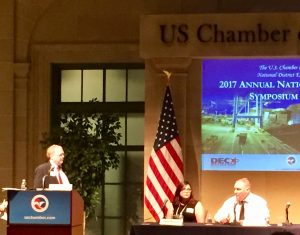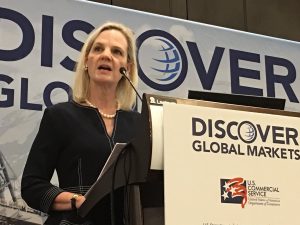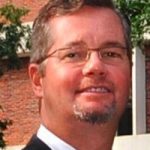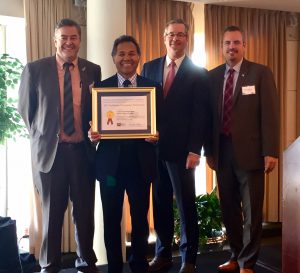The California Chamber of Commerce recently joined nearly 125 trade specialists from across the nation for sessions focused on trade issues at the National District Export Council’s (NDEC) Annual Export Symposium in Washington, D.C.
Susanne T. Stirling, CalChamber vice president of international affairs, was among participants at the September 27 Annual Trade Symposium, held and presented by the U.S. Chamber of Commerce together with the National District Export Council (DEC). Stirling serves on the Northern California DEC, the steering committee of the National DEC, and the International Policy Committee of the U.S. Chamber of Commerce.
The symposium was opened by Robert Brown, chair of the National DEC, and Christopher Wenk, executive director, international policy for the U.S. Chamber. Brown had been re-elected as National DEC Chair for 2017–18 the day before the symposium.

Wenk opened by reiterating U.S. Chamber support for the North American Free Trade Agreement (NAFTA), and stating that the first priority during the negotiations is “to do no harm.” The U.S. Chamber and the CalChamber support modernizing NAFTA and doing so in a timely fashion. The presidential election in Mexico and the U.S. mid-term elections loom large over the timing of the negotiations.
Wenk went on to indicate U.S. Chamber support for the U.S.-Korea Free Trade Agreement. In particular it makes sense to focus on the full implementation of the agreement, rather than withdrawing as recently was hinted by the Trump administration.
Lastly, Wenk mentioned the need for a quorum at the Export-Import Bank. Wenk went on to explain that the U.S. Chamber had just earlier in the week indicated it does not support Senate confirmation of the President-appointed Chair, as he has not shown himself to be a supporter of the Ex-Im Bank functions. However, the U.S. Chamber is supportive of having a full quorum to be able to move the Ex-Im Bank operations forward. In the interim, deals are limited to $10 million.
The audience heard a “View from the Hill” by Representative Andy Barr (KY, R-6th), who serves on the Financial Services Committee. The Congressman expressed his support for free trade, and how he is working with the administration on this. Further, the representative stated the desire for a soft Brexit and a process that is stable, as the United States has great interest in the British financial markets. He also is urging a speedy U.S.-UK Free Trade Agreement (FTA) negotiation process.
Representative Barr said his committee is interested in furthering the diversity of the portfolio of the Ex-Im Bank, as it is highly concentrated in certain industries and geographical areas. The bank supports 2% of exports, so there needs to be more focus on opening foreign markets for U.S. business in general. The Congressman went on to state that the very high U.S. corporate tax rate needs to be reformed, which would help international transactions.
A U.S. Commerce Department update was presented by Israel Hernandez, acting under secretary for the International Trade Administration. Until Labor Day, no individual other than the U.S. Commerce Secretary Wilbur Ross had received U.S. Senate confirmation. Since then, three other officials have been confirmed.
Hernandez said that Secretary Ross is well-known by the business community and is a fierce supporter of American growth, specifically intellectual property protection. Turning to the NAFTA negotiations, Hernandez said that all the chapters are expected to be tabled soon. There are stakeholder meetings following every set of negotiations, and Hernandez urged the business community to further engage. Technical discussions are under way that could lead to a U.S.-UK FTA, Hernandez said, but there are European steps that must be taken first. He also indicated continued interest in a possible transatlantic agreement.
Export Controls was the subject with Rich Ashooh, assistant secretary – export administration, U.S. Department of Commerce; Michael Dondarski, assistant director for enforcement, U.S. Department of Treasury; and Lauren Wilk, director of trade facilitation policy, National Association of Manufacturers. Regulatory reform is a priority for the current administration. There also was a discussion of current U.S. sanction programs, and the administration’s desire to make these as clear as possible for the business community, as well as effective internationally. Oz Erdem, vice chair of the National DEC, moderated this session.

Export Control Programs were further discussed with CalChamber member Roy Paulson, president, Paulson Manufacturing Corporation and former National DEC Chair, and Laura Molinari, executive counsel, international trade compliance, GE. These companies gave a private sector perspective on the impact of the export control programs — and finding a balance between cost and compliance. The companies expressed an interest in making sure that their customers also were in compliance and well-documented in their compliance efforts. The panel was led by former National DEC Chair Dan Ogden.
Federal and Local Programs / Grants were the subject of a panel with Andy Karellas, executive director, State International Development Organizations; Peter Cazamias, associate administrator for international trade, U.S. Small Business Administration (SBA); Aaron Miller, international trade manager, Virginia Small Business Development Center, and John Holman, director, U.S. Commercial Service, Hawaii. Programs discussed included the State Trade Export Program (STEP), which has been expanded from a one-year to a two-year program. California was just awarded a STEP grant.

Luncheon speaker Erin Walsh, assistant secretary and director general of the U.S. and Foreign Commercial Service, emphasized that economic security will be equivalent to economic success. She said the U.S. and Foreign Commercial is present to assist exporters. Walsh went on to present the DEC of the Year Award to the Hawaii DEC, and the Executive Secretary of the Year Award to the North Carolina DEC representative.
Trade Policy Updates and Key Issues were presented by: Shawn Jarosz, president, Trademoves, LLC and former chair, ITEC 11; Christina Sevilla, deputy assistant small business, Office of the U.S. Trade Representative; Pat Kirwin, Trade Promotion Coordinating Committee, U.S. Department of Commerce; Rosalyn Steward, SBA Office of Advocacy; Eduardo Diaz Gavito, former chair, Mexico Trade & Customs Commission; and Tim Wedding, deputy assistant Europe (UK/Brexit), Office of the U.S. Trade Representative. One of the main topics of this panel was the ongoing NAFTA negotiations, and how there will be a chapter devoted to small and medium-sized enterprises. In the United States, a small business is one with fewer than 500 employees. For members of the OECD, the number is 200. Other topics included the need for harmonization of the rules of origin process. The current NAFTA has a side agreement on labor. Now there is discussion of a specific chapter on labor. This panel was moderated by Richard Grana, a member of the National DEC.
Participants received an Update on the Export-Import Bank from Jesse Law, chief of staff, Ex-Im Bank; Jennifer Hazelton, senior vice president for communications, Ex-Im Bank; Eric M. Aberbach, vice president for global trade, commercial banking, J. P. Morgan Chase; and Glenn Sigler, University of Alabama. All indicated support for the Bank, and the need for the Bank to be proactive in the small and medium-sized business world. All are looking forward to a quorum on the Ex-Im Board, so they can service the pending deals and support competitiveness. William Cummins of the National DEC moderated the panel.
Finally, the Symposium was addressed by Congressman Steve Chabot (R-OH), chairman of the U.S House Small Business Committee and a longtime supporter of free trade. Chabot stated that more U.S. small businesses need to export. He acknowledged the administration’s leaning toward bilateral free trade agreements, while he indicated support for bilateral and multilateral agreements.

In his closing remarks, National DEC Chair Robert Brown emphasized the need for the District Export Councils around the country to continue to support the U.S. Department of Commerce – International Trade Administration budget.
National DEC Forum
The National DEC is made up of the 60 regional district export councils. The more than 1,500 DEC members around the country all are appointed by the Secretary of the U.S. Department of Commerce. Stirling serves on the Northern California DEC and on the Steering Committee of the National DEC. The mission of the DECs is to work with the Commerce Department on export promotion and commercial

Welcoming about 60 members to the Thursday, September 28 National DEC Forum was Tom McGinty, acting assistant secretary for the U.S. Commerce Department. Attending the forum from California were members of the NorCal DEC, the San Diego DEC, and the Inland Empire DEC. Earlier this year, McGinty joined the May 2017 California DEC meeting held at the CalChamber.
McGinty stated that of every $1 spent by the U.S. Department of Commerce, there is $192 of wealth generated. In the client base the International Trade Administration serves, customers’ satisfaction rate is 78%. In addition, McGinty spoke of the success of the “Discover Global Markets” series of 16 events nationwide. Regarding the ITA budget, McGinty is optimistic about maintaining the current funding, which in these times is positive. The program then went on to recognize exemplary DECs, including the Inland Empire DEC from California.

During the day, DEC best practices, projects and engagement were discussed with examples given by: Ryan Kanne, director, U.S. Commercial Service Minnesota; Patricia Cook, director, U.S. Commercial Service Iowa; Jessica Gordon, director, U.S. Commercial Service North Texas; Kenneth Mouradian, director, U.S. Commercial Service Orlando; and Fred Latuperissa, director, U.S Commercial Service Inland Empire. This session was led by Laura Barmby, the DEC liaison with the U.S. Department. She has taken a professional interest in working with the DECs around the country to ensure coordination and success.
National DEC Projects and DEC Engagement were discussed by: Daniel T. Crocker, commercial service vice president, AFSA; Daryl Bouwkamp, chair, Iowa DEC; John Hock, Hawaii DEC; Cary Wanner, Chair, California Inland Empire DEC; and, Lenka Horakova, vice chair, Arkansas DEC. This discussion was led by National DEC Secretary Shawn Levsen. Topics included the importance of director and officers insurance for the DECs, together with the use of video conferencing and taping.
The Future of Your DEC: International Preparedness was then discussed with presentations as follows: Groundwork for Effective Response with Michael Marangell, former coordinator for Gulf restoration; Managing Suppliers with Susan Parker, director of purchasing, Kenmark; and Port Congestion and Supply Chains with Russell Adise, international trade specialist. With what seems to be increasing disruption in the supply chain due to natural disasters and other issues, all speakers encouraged communication and coordination, in order to be better prepared for an emergency. Also noted was that the Federal Emergency Management Agency (FEMA) has a business center, where information is distributed about any current situation. SBA also can provide disaster recovery for small businesses. An example of government assistance is the current waiver of the Jones Act for 10 days to assist with the hurricane recovery process.
The day concluded with a joint reception at the U.S Capitol Visitors Center, hosted by the Centers for International Business Education and Research (CIBER), which was having its annual meeting in Washington, D.C. concurrently. Mark Ballam, managing director of the San Diego State University – CIBER Program and a member of the National DEC, coordinates this joint effort.
The DEC meetings next year will be held again in Washington, D.C., on October 2–3, 2018.


